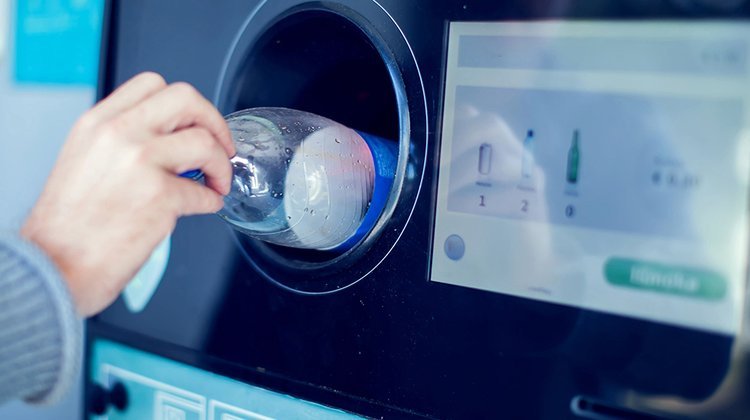DRS: Concerns over recycling system that burdens supermarkets and consumers
Marios Ioannou 07:35 - 13 June 2023

Retailers, suppliers, affected associations and organisations are concerned by the resumption of the Deposit Return System (DRS) debate, which came like a bolt from the blue after two years on the back burner.
On 12 June, the Department of Environment held a relevant meeting at the Ministry of Finance, with the participation of the involved associations and bodies, regarding the legislative framework and the practices applied in the EU on the deposit return system.
The draft of the Packaging and Packaging Waste (Deposit Return System - DRS) Regulations was put to public consultation in 2021, causing a strong reaction, both from the Cyprus Chamber of Commerce and Industry (CCCI) and from all the associations involved in the food retail trade.
The charge and the refund
In more detail, the DRS is a system that provides for the installation and operation of deposit return recycling systems for the separate collection of plastic, glass, and aluminum packaging waste and which will be placed in the parking lots of supermarkets that have properties over 200 sq.m. in size.
Consumers who buy a bottle of water or a soft drink will pay an additional cash fee which will be refunded when the packaging is returned, in good condition, to the collection point.
Based on the said draft, the fee is expected to rise to 5 cents for packages of up to 0.5 liters, while for packages from 0.5 to 3 liters, the fee will reach 10 cents. Consumers will incur these charges when they buy such packaging (for example aluminum cans, plastic, and glass bottles) and only be refunded if they return the used packaging in good condition to the designated areas of the supermarkets.
CCCI raises concerns with Petros Xenophontos
In a letter to the Minister of Agriculture, Rural Development and Environment Petros Xenophontos, the CCCI once again expressed the concern of both the Chamber and the affected associations over the non-differentiation of the provisions of the draft, specifically emphasising that the Department of Environment has, in their view, chosen to ignore the directly interested parties and those who are essentially called upon to implement the system.
One of the serious concerns regarding and objections to the implementation of the system is the issue of the cost that will be required for the implementation of the deposit return system, (the amount of the fee, the obligation of merchants to purchase and install the relevant machines) as well as the practical and operational problems it will cause in relation to its application.
"Especially in a period when we are going through any increase in costs, whether it concerns infrastructure costs or costs related to the value of products, we believe that it will have negative effects on businesses and consumers," the Chamber underlines in its letter to Petros Xenophontos, requesting an immediate meeting in order to clarify the issue.
It is also worth mentioning that in the draft regulations, increased obligations are imposed on the merchants of warranty packages, i.e. all points of sale, in a manner that greatly affects their operation.
As the CCCI explains, large stores of over 200 sq.m. will have to invest in infrastructure and DRS machines, something they consider not to be their responsibility, while the smaller stores will have to internally provide the infrastructure for receiving and managing packaging. It should be emphasised that in both cases a redesign of the space, interior and exterior, and of the points of sale is required with huge spatial and operational costs, but also in some cases, health risks and problems.
The points of sale of less than 200 sq.m., also raise concerns over the unfair competition that is anticipated to be created with the big stores, which will have the required spaces to place the DRS machines, thereby driving consumers to these points.
On the other hand, businesses, such as small supermarkets and kiosks, will have to create the necessary infrastructure for returning - receiving - managing the packages, which is equivalent to a huge increase in their operating costs in addition to the other problems that will be created.
Of particular concern to the CCCI is the possibility that consumers will focus their efforts on sorting only packaging that will have value and in the end abandon the separation of other packaging materials, destroying all the progress made in recent years in developing a recycling culture.
Disproportionate costs for businesses and consumers
Speaking to InBusinessNews, the general secretary of the Pancyprian Retail Trade Association (PASYLE), Marios Antoniou, expressed his strong displeasure at the reinstatement of the same draft regulations, which, he said, had caused a lot of reactions about two years ago, explaining that the positions, opinions and proposals of the involved associations and bodies had not been taken into account.
"There are reasonable questions as to why the Department of the Environment has chosen to re-promote the legislation in question, which imposes disproportionate costs on retailers and consumers," he pointed out, making particular reference to the increased costs that will result from the installation of the special machines in supermarkets, their maintenance costs, and also the cost of employing staff who will manage the specific machines.
Alternative proposals
Both retailers and other professional associations, instead of implementing DRS for products in relevant packaging, request the acceleration of the implementation of practices such as the pay-as-you-throw system implemented by the Municipality of Aglandjia, as well as strengthening the door-to-door recycling system implemented by Green Dot.
In any case, perhaps the most successful recycling system in the EU that Cyprus could follow is the Belgian one, with the collection of recyclable waste either from the house or through placement at collection points, as well as the imposition of higher taxation for waste that needs more processing. Through this practice, citizens might be doubly careful about the packaging they throw away.
(Source: InBusinessNews)

